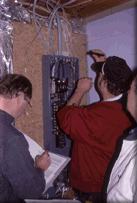|
working with an agent
/ choosing an agent
/ find a home
/ |
|
|
Conduct A Home Inspection
|
|
|
Buying a home is probably the largest single investment you will ever make. In doing so, you should learn as much as you can about the condition of the property and the need for any major repairs before you purchase. A home inspection is usually set up within a few days after the contract or purchase agreement has been signed. However, before you sign the contract, be sure that there is an inspection clause in the contract, making your purchase obligation contingent upon the findings of a professional home inspection. This clause should specify the terms to which both the buyer and seller are obligated. A home inspection not only points out the bad, but the good aspects of a home, as well as the maintenance necessary to keep it up. After a home inspection, you will have a better understanding of the home you are about to purchase, and will be able to make a more confident decision on buying. While it is not required for you to be present for the inspection, it is strongly recommended. By following the home inspector around and observing and asking questions, you will learn a great deal about the condition of the home, how its systems work, and how to maintain it. You will also find the inspector’s written report, which you’ll receive after the inspection, easier to understand if you've seen the property first-hand with the inspector. No house is perfect. If the inspector finds problems, it doesn't necessarily mean you shouldn't buy the house, only that you will know in advance what to expect. A seller may be flexible with the purchase price or contract terms if major problems are found. If your budget is very tight, or if you don't wish to become involved in future Here are some Helpful Hints for a Hassle-Free Home Inspection:
|
|
|
|

|
 repair work, this information will be extremely important to you.
repair work, this information will be extremely important to you.